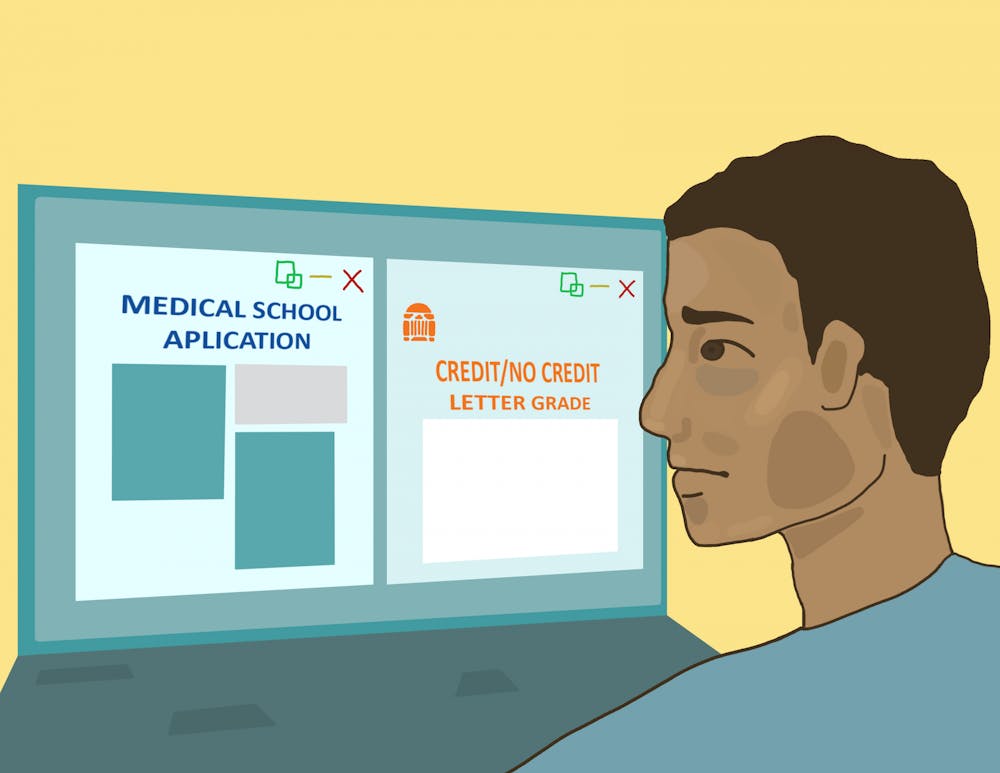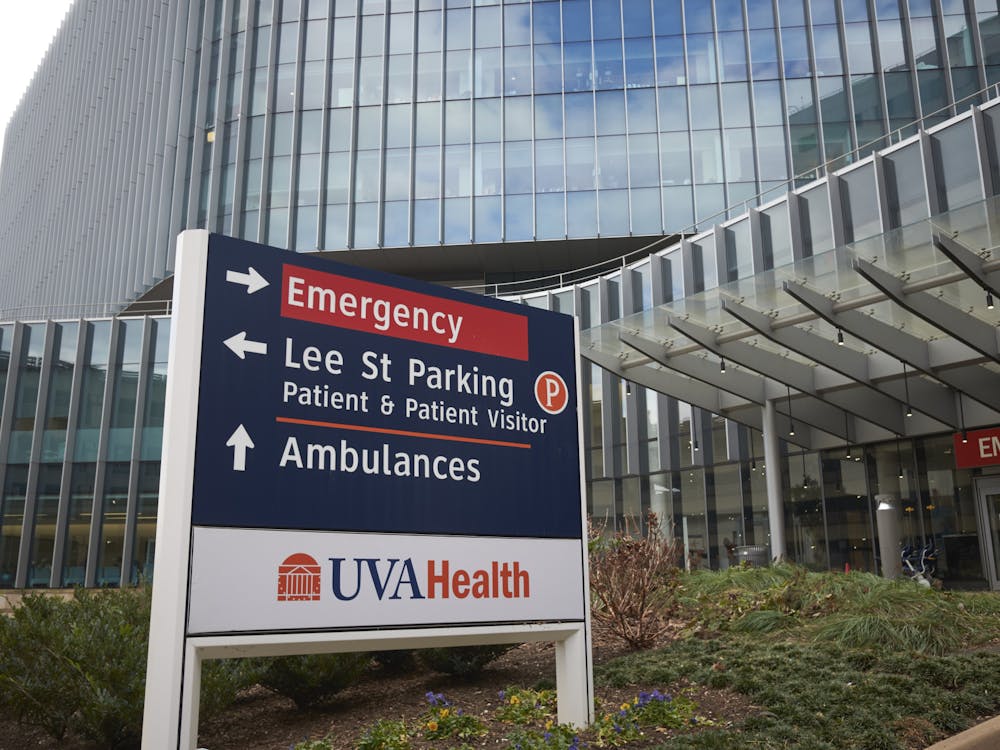Provost Liz Magill sent out an email to all of the University’s undergraduate students Oct. 9 announcing students’ ability to switch from receiving a letter grade for classes to receiving credit/general credit/no credit for all classes taken this semester, even ones that apply to requirements, majors and minor. While for some students this option allowed them to breathe a sigh of relief, for premed students who will be applying to medical school after graduation, the decision to opt-in to these grading options inherently involves them weighing multiple factors, including future admissions cycles.
The deadline for students to switch their grading option to credit/general credit/no credit was Nov. 6, which caused stress amongst premed students due to the uncertainty of how their grades will look this semester and how the medical school admissions committees will view this option on transcripts. However, students are encouraged to not worry, regardless of what option they chose, as there are many ways to strengthen a medical school application.
In her email, Magill stated that the credit/general credit/no credit option was implemented in recognition of the new learning environment the pandemic brought about. Although classes taken using the credit/general credit/no credit option can be used towards graduation requirements, Magill noted that the University has no control over how this option will be interpreted by graduate schools and encouraged students to select the option that is best for them based on their future plans.
This ambiguity about the credit/general credit/no credit option for graduate school admissions has caused confusion amongst premed students who have plans of pursuing medical school. Some of those students, including first-year College student Keerthana Pasumarthy, feel as though taking the option may be a disadvantage to them when applying to medical programs.
“I didn't choose the credit/ no credit [option] because when I talked to my advisor and peers around me who are doing premed specifically, they did state that a lot of med schools don't like that option,” Pasumarthy said.
A similar decision was made by fourth-year premed College student Katie Stombres.
“Now all of my classes are on Zoom and I have very little opportunity to get much needed hands-on experience, not to mention the fact that I now have to bond with my professors during their online office hours so they can write me a recommendation,” Stombres said in an email to The Cavalier Daily. “I do not have time to worry whether or not taking classes C/NC will mess up my application. I can’t afford to not get grades.”
An email from the U.Va. Career Center to professors mentions that some graduate medical schools do not accept the credit/general credit/no credit option for prerequisite courses. Additionally, even if graduate schools accept this option, they may prefer to see some grades on the transcripts.
Dr. John Densmore, associate dean for admissions and student affairs at the School of Medicine, says that although the University does not require any prerequisites for its medical school and therefore accepts the credit/general credit/no credit option, seeing letter grades could be more informative for admissions committees.
“At this point, I think I would tell people to do what they're comfortable with,” Densmore said. “The caveat would be if this [option] continues … having some grades in, particularly in science type classes, I think would be helpful.”
Biology Assoc. Prof. David J. Kittlesen also agrees that it would be helpful for students to provide grades to future schools as it is important to show a record of performance in college. In regards to medical school admissions specifically, Kittlesen suspects that they will be largely unaffected by the pandemic because most students still have the option of sending letter grades.
“Students need to provide that information,” Kittelesen said. “They need to provide a track record in terms of letter grades … I suspect that admissions committees won't feel a need to change how they evaluate students. Rather, students will have to make decisions of how they can adapt to those requirements.”
Kittlesen’s main advice to adapting to medical school requirements during the pandemic environment is that if students have selected the credit/general credit/no credit option for a course, they should supplement their transcripts — at a later point during their time at the University — with a similar or higher-level course in the same subject for a letter grade.
“For example, if a student takes BIO 2100 credit/no credit, they can take an upper level [biology class] during a subsequent semester for a letter grade,” Kittlesen said. “Now they've got on their transcript what's required.”
Additionally, there are still other parts of the medical school application that premed students can focus on. Densmore points to four critical components of the application apart from grades that the application committee will be looking at for admission into the University’s School of Medicine — MCAT score, clinical experience, research and volunteering. Therefore, premed students should not only be concerned about grades during this pandemic and should realize that there are other activities they can pursue to help make their application stronger.
Another point of stress for premed students was making a decision about the credit/general credit/no credit option by the Nov. 6 deadline due to the fact that some students were unsure of their grades in some classes.
“There's a lot of tests that are left, not including finals,” Pasumarthy said. “It's really not enough time. I think they should have extended at least like one to two more weeks, so people can start calculating their grades.”
Pasumarthy does say that some of her professors have been good at keeping students informed about their performance in the class through either sending an estimated calculated overall grade or updating individual grades on Collab for assignments. However, other professors have not updated her with grades because of factors such as curving, which makes it difficult to gauge performance in those classes.
Stombres also agrees that the deadline was too early as not all classes had enough assignments or grades in to help a student assess what grading option to choose
“This year I even had a class that changed professors halfway through the semester who had very different teaching [and] testing styles.” Stombres said. “This was even a problem for me without COVID. The add/drop date had passed before I even got my first grade on my first assignment in a class.”
The pandemic environment, in addition to the credit/general credit/no credit option, has increased the importance of performance feedback in classes to ensure that students have enough information to make an informed decision about the grading opportunity.
The grade in a class is what ultimately guides the decision-making process. Kittlesen recommended that students with grades in the A and B range should not opt for the credit/general credit/no credit option.
“If I see on a student's transcript, credit, I am probably going to be thinking that that student was like the C range on their performance,” Kittlesen said. “I'm not likely to think that that student was in the A range or even … the B range.”
Pasumarthy used the same decision making process in choosing to opt for letter grades for all her classes on her transcript, but she does mention that it was difficult in finding resources in aiding with this decision making process.
“I think there was not enough information put out on why maybe you should take credit/ no credit,” Pasumarthy said.
She believes that it would’ve been helpful if the University had provided more resources for helping premed students, which would’ve helped relieve some of the stress premed students encountered when having to make this decision.
Stombres however had a different perspective on the stress related to choosing a grading option.
“Was I stressed?” Stombres said. “Yes. About this decision making process? No, not really. It wasn’t a decision for me. I literally never considered taking my classes C/NC — it wasn’t an option.”
With the Nov. 6 deadline having passed, Densmore acknowledges the flexibility that the School of Medicine will have with incoming applicants.
“This is such a difficult time to be a student, and students have had to be so flexible … and we'll make every effort to give our students and students from other places the benefit of the doubt,” Densmore said.
Therefore, there is no one right answer for the best grading option, according to Kittlesen, and it really depends on every student’s unique situation.
“The schools are looking for broad patterns,” Kittlesen said. “They're looking for overall, how has a student done in dozens of courses, not in one particular course. I would encourage students as always, to follow their passions, and to realize that … the occasional mistake is not unrecoverable.”





